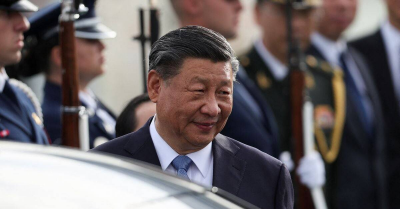Reuters-Chinas Xi Jinping in US for tense Biden summit and APEC
November 14, 2023 5 min 881 words
这篇报道显示,中美关系紧张,习近平访美备受关注。美国国务卿蓬勃表达对自由和法治的重视,是对中国的不直接表态。此次美中峰会被宣传为降低紧张局势的机会,但经济问题、军事联系、地缘政治紧张局势等问题均凸显在议程中。拜登强调改善中美关系,但强调经济关系的变革,表达不寻求完全脱钩的意愿。面对乌克兰、以巴冲突等问题,两国领导人将进行广泛的讨论。报道还提到了中国的抗议活动,反映了在美中关系中存在的分歧和争议。这次会晤将成为双方在重大问题上取得共识的关键时刻,但挑战仍然严峻。
Chinese President Xi Jinping began his first visit to the United States in six years on Tuesday just after U.S. Secretary of State Antony Blinken took a thinly veiled swipe at Beijing by stressing the need for freedoms and rule of law.
Xi is on his first visit to the U.S. since 2017. He is due to meet U.S. President Joe Biden at an undisclosed location in the San Francisco Bay Area on Wednesday morning and then attend the annual summit of the Asia Pacific Economic Cooperation (APEC) forum.
His summit with Biden will be the first face-to-face meeting between the U.S. and Chinese leaders in a year and has been billed by U.S. officials as an opportunity to reduce friction in what many see as the world's most dangerous rivalry.
Xi waved from atop a passenger staircase attached to his Air China plane and then descended to meet U.S. officials waiting on the tarmac, including Treasury Secretary Janet Yellen and U.S. Ambassador to China Nicholas Burns.
He then got into his Chinese Hongqi, or "Red Flag," limousine and departed the airport into the city, where demonstrations are expected both for and against his visit.
Less than two hours earlier, Blinken addressed ministers of the 21-member APEC and stressed the U.S. believed in "a region where economies are free to choose their own path ... where goods, ideas, people, flow lawfully and freely."
Blinken did not mention China in his remarks, but his language echoed U.S. rhetoric in recent years in which Washington has accused China of bullying smaller countries in the Indo-Pacific and trying to undermine what the U.S. and its allies call the existing "rules-based" order.
U.S. Trade Representative Katherine Tai, who with Blinken opened the APEC ministerial session, said the San Francisco meeting came at a time of "great uncertainty and challenges" for the region. She noted increasing geopolitical tensions, fragile supply chains and a worsening climate crisis.
Earlier, Biden said his goal in his talks with Xi would be to improve the relationship with China after a period of strained ties. He said he would seek to resume normal communications between the two superpowers, including military-to-military contacts.
White House national security spokesperson John Kirby told reporters Biden and Xi would also talk about the Israel-Hamas conflict in Gaza as well as U.S. efforts to support Ukraine in its battle to repel Russian invaders.
Economic issues will be high on the agenda.
Biden said the U.S. does not want to decouple from China but wants to change the economic relationship for the better.
His administration has made a push to "de-risk" some critical U.S. supply chains from China as the two countries’ economic and military competition has grown.
But it has been careful to assure countries in the region, including China, that the U.S. does not seek complete economic separation, a notion that has fueled concerns among Washington's partners and allies of a superpower showdown that would upend the global economy.
The Chinese severed military-to-military contacts with the U.S. after then-House of Representative Speaker Nancy Pelosi visited democratically governed but Chinese-claimed Taiwan in August 2022.
Restoring the contacts is a top U.S. goal to avoid miscalculations between the two militaries.
Relations between the two countries grew particularly frosty after Biden ordered the shooting down in February of a suspected Chinese spy balloon that flew over the United States.
Top Biden administration officials have since visited Beijing and met with their counterparts in an effort to rebuild communications and trust.
Several hundred mostly pro-China demonstrators carrying Chinese flags gathered outside the Chinese delegation's hotel ahead of Xi's arrival in the U.S.
Larger protests, including by rights groups critical of Xi's policies in Tibet, Hong Kong and toward Muslim Uyghurs, are expected to gather near the summit venue on Wednesday.
As Biden arrived in San Francisco, shortly before Xi was due to land, dueling demonstrators greeted the U.S. president's motorcade from the airport. Some waved Chinese flags and held banners calling for "kindly" and "warm" U.S.-Sino ties. Others held signs condemning the Chinese Communist Party.
Earlier on Tuesday, a small aircraft flew circles over the APEC summit venue in downtown San Francisco, trailing a banner that read "END CCP FREE CHINA FREE HK FREE TIBET FREE UIGHUR," referring to China's treatment of Uyghurs, which the Biden administration calls "genocide."

